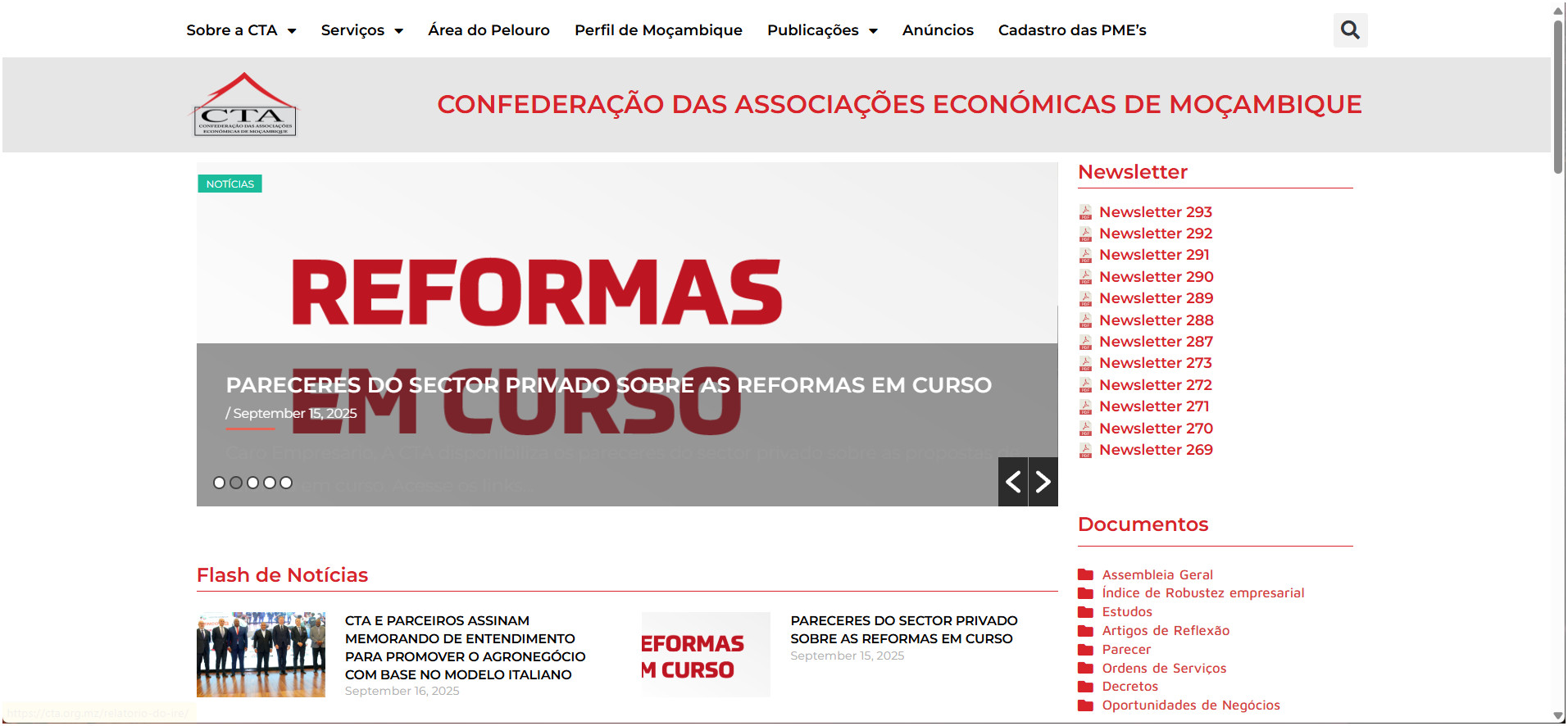Confederação das Associações Económicas de Moçambique (CTA)

Confederation of Economic Associations of Mozambique
For investors, the CTA is a critical resource, providing access to advocacy, market insights, and networking opportunities. It engages with the government to streamline regulations, such as those for company incorporation or tax incentives, and supports sectors like agriculture, tourism, and energy through policy reform.
Introducing CTA: Mozambique's Premier Private Sector Advocate for Investors
Mozambique's private sector is a vital engine of economic growth, and at its forefront stands the Confederação das Associações Económicas de Moçambique (CTA), the Confederation of Economic Associations of Mozambique. As a non-governmental, non-partisan organization, CTA serves as the unified voice of the country's business community, fostering dialogue between the private sector and the government to cultivate a thriving business environment. For foreign investors exploring opportunities in sectors such as agriculture, mining, energy, and tourism, CTA offers invaluable insights, networking, and advocacy to navigate Mozambique's dynamic market. Established amid the nation's transition to a market economy, CTA has grown into a influential platform that promotes inclusive growth, regulatory reforms, and sustainable business practices. As of September 2025, with Mozambique's economy rebounding through FDI in natural resources and infrastructure, CTA continues to champion policies that enhance investor confidence and operational ease.
Establishment and History
CTA traces its roots to the profound economic shifts in Mozambique during the late 1980s and 1990s. Following the adoption of the Programa de Reabilitação Económica (PRE) in 1987, the country began transitioning from a centrally planned economy to a free-market system, including widespread privatization. However, this transformation faced challenges, including outdated laws, bureaucratic hurdles, and a legal vacuum that impeded private enterprise. Entrepreneurs often had to engage directly with high-level officials to resolve routine issues, highlighting the need for a coordinated private sector response.
In response, the Comissão de Trabalho das Associações (Working Committee of Associations) was formed in 1996 as a forum to coordinate interactions with the government and advocate for new laws conducive to business. On April 5, 1996, this evolved into the formal Confederação das Associações Económicas de Moçambique (CTA), solidifying its role in addressing market economy challenges. By 1999, CTA had fully transitioned into a confederation structure, representing diverse economic associations nationwide.
While not established by a specific government decree like public agencies, CTA operates under its own statutes and is recognized as the official private sector interlocutor with the government. Its legal framework is grounded in Mozambique's broader associative laws, enabling it to influence policy through consultations and position papers. This history positions CTA as a resilient partner for investors, with deep institutional knowledge of regulatory evolution.
Mission, Vision, and Values
CTA's mission is to build and lead, alongside its partners, a business environment that positions the private sector as an active driver of the national economy. It also aims to foster inclusive, proactive, and prosperous business organizations, ensuring that Mozambican enterprises contribute meaningfully to sustainable development.
The vision of CTA is to cultivate a cohesive, productive private sector that generates and equitably distributes national wealth, empowering businesses to lead economic transformation.
At the core of CTA's operations are its guiding values, which emphasize ethical and efficient practices
Roles and Functions
As Mozambique's leading private sector confederation, CTA plays a pivotal role in bridging the gap between businesses and policymakers. Its primary functions include:
- Advocacy and Policy Influence: Representing the private sector in official dialogues with the government to promote economic and regulatory reforms that improve the business climate.
- Promotion of Business Opportunities: Protecting and expanding private initiatives, including fostering associativism and culture among entrepreneurs.
- Economic and Social Development: Contributing to national growth by mobilizing the business community for poverty reduction, job creation, and inclusive prosperity.
- Strategic Coordination: Leading efforts to enhance private sector cohesion, productivity, and access to resources.
Through its National Business Council (CEN), CTA provides high-level advisory support to its leadership, ensuring decisions reflect the diverse needs of members. The organization's strategic plan, building on the ambitious 2017-2020 framework, continues to prioritize investment-friendly policies, member engagement, and external visibility, transforming CTA into a public utility entity scrutinized for its impact on national development.
For foreign investors, CTA functions as a strategic advisor, helping to identify sector-specific opportunities and mitigate risks through collective bargaining.
Services for Foreign Investors
CTA offers a suite of services tailored to empower businesses, with particular value for foreign investors entering or expanding in Mozambique. As a member-based organization, it provides:
- Gabinete de Apoio Empresarial (GAE - Business Support Office): Key interventions include compliance management, business promotion and development, facilitation of access to financing, and capacity-building programs to streamline operations.
- Desenvolvimento Associativo (Associative Development): Support for networking, sector-specific forums, and linkage-building between local and international firms.
- Provedor do Empresário (Business Ombudsman): A dedicated service to resolve disputes, address grievances with authorities, and ensure fair treatment—crucial for navigating regulatory challenges.
- Responsabilidade Social (Corporate Social Responsibility): Guidance on sustainable practices and community engagement to align investments with national development goals.
- Export and Internationalization Support: Initiatives like the Pavilhão do Exportador, a platform aiding national firms in global expansion, which can connect foreign investors with local partners for joint ventures.
CTA organizes events, training, and matchmaking sessions, such as partnerships with financial institutions like Microbanco Sólido to boost SMEs. Membership, open to associations and enterprises, grants access to these resources, policy updates, and exclusive briefings, making it an essential tool for foreign entities seeking local integration.
For more details, visit the CTA's official website or contact their offices in Maputo.
Av. Patrice Lumumba, 927 – Maputo – Mozambique
Tel.: +258 21 32 10 02 | Tel: +258 82 319-1300
Email. cta@cta.org.mz

